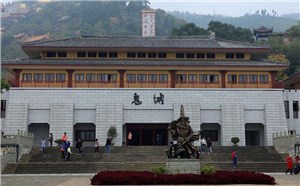Fengdu Ghost City, often simply referred to as “Ghost City,” is a unique and culturally significant tourist attraction located in Fengdu County, Chongqing Municipality, China. This ancient city has a rich history that dates back over two thousand years and is closely associated with Chinese folklore, religion, and mythology. According to legend, two officials from the Han Dynasty, Yin Changsheng and Wang Fangping, who were practicing Taoist immortality, came to the mountain to cultivate their skills. Over time, they became immortals and were granted the status of gods of the underworld. Fengdu then became associated with the afterlife and the spirits of the deceased.

Fengdu is often described as the “Gateway to the Afterlife” or the “City of Ghosts” because it is believed to be the place where spirits or souls go to be judged before they can move on to the afterlife. This concept is similar to the Western idea of purgatory, where souls are tested and judged for their deeds in life before being sent to their final destination, whether it’s heaven or hell. The city features numerous temples, shrines, and statues dedicated to the gods and deities associated with the afterlife. Visitors can explore these religious sites and learn about the rituals and ceremonies performed by Taoist and Buddhist practitioners to guide the souls of the deceased.
Fengdu’s spiritual significance is deeply rooted in Taoist and Buddhist beliefs. The city’s architecture and artistic elements reflect the balance of Yin and Yang, which is central to Taoist philosophy. The city’s layout and design aim to recreate the Chinese vision of the underworld, serving as a place where the living can come to understand and prepare for the afterlife. The most famous of these sculptures is the “Ghost King” statue, which is said to be the ruler of the underworld.
Fengdu Ghost City has evolved into a popular tourist destination in modern times, attracting visitors from all over the world. The city’s unique blend of history, mythology, and cultural significance has made it a must-visit location for those interested in Chinese folklore and religious practices. Visitors can explore the eerie statues, sculptures, temples, and other structures that showcase the vivid and imaginative interpretations of the afterlife in Chinese culture. It’s a place where tourists can learn about Chinese folklore, history, and religious beliefs.
In recent years, efforts have been made to preserve and renovate Fengdu Ghost City to ensure its historical and cultural significance endures for future generations. While some of the original structures have undergone reconstruction, the city remains a vital site for the study of Chinese religious and mythological traditions. Fengdu Ghost City stands as a testament to China’s rich cultural heritage, blending elements of Taoism, Buddhism, folklore, and myth into a unique and captivating destination that continues to intrigue and educate visitors about Chinese beliefs regarding the afterlife.




































